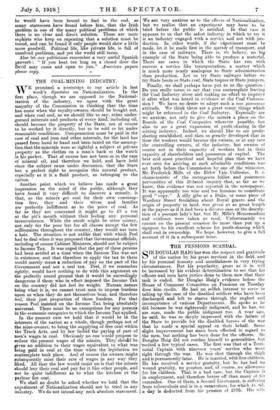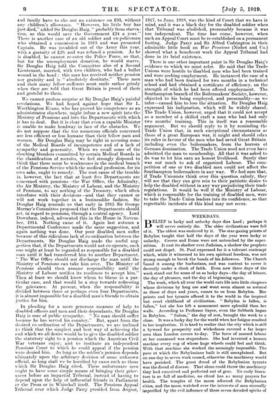THE PENSIONS SCANDAL.
SIR DOUGLAS HAIG has won the respect and gratitude of the nation by his great services in the field, and by his personal honesty and unselfishness in very trying circumstances. But his popularity, great as it is, will be increased by his evident determination to see that his officers and men have justice done to them now that their task is ended. Sir Douglas Haig's evidence before the House of Conimons Committee on Pensions on Tuesday does him credit. He had no selfish interest to serve in taking up the case of the disabled soldiers who have been discharged and left to starve through the neglect and incompetence of various Departments. He spoke as he did. because he was righteously indignant, and he has, we are sure, made the public indignant too. A year ago, he said, he was so deeply impressed with the failure of the State to provide for the disabled heroes of the war that he made a special appeal on their behalf. Some slight improvement has since been effected in regard to the men, but nothing has been done for the officers. Sir Douglas Haig did not confine himself to generalities, but 'recited a few typical cases. The first was that of a Territorial Captain with nineteen years' service who went right through the war. He was shot through the thigh and is permanently lame. He is married, with five children. He has received a service gratuity, but he has had no wound gratuity, no pension, and, of course, no allowance for his children. That is a bad case, but the Captain is in employment, and therefore better off than many of his comrades. One of them, a Second Lieutenant, is suffering from tuberculosis and is in a sanatorium, for which 4s. 6d. a day is deducted from his pension of £175. His wife and family have to eke out an existence on £93, without any children's allowance. " However, his little boy has just died," added Sir Douglas Haig, "probably from starvation, so this would save the Government £24 a year." There is another case of an old soldier and ex-policeman who obtained a commission in 1915 and was promoted Captain. He was invalided out of the Army this year, with a gratuity of £20, and was refused a pension. As he is disabled, he cannot re-enter the Police Force, so that, but for the unemployment donation, he would starve. Sir Douglas Haig told the Committee also of a Second Lieutenant, married, with two children, who had a bullet wound in the head : this man has received neither pension nor gratuity and is "absolutely destitute." These men and their many fellow-sufferers must smile rather grimly when they are told that Great Britain is proud of them and grateful to them.
We cannot profess surprise at Sir Douglas Haicr's painful revelations. We had hoped against hope that Sir L. Worthington Evans, who has proved his competence as an administrator elsewhere, might infuse a new spirit into the Ministry of Pensions and into the Departments with which it has to deal. But it is clear that even a capable Minister is unable to make headway in face of the obstacles. We do not suppose that the too numerous officials concerned are less efficient or less humane than their fellow men and women. Sir Douglas Haig may be right in accusing some of the Medical Boards of incompetence and of a lack of sympathy and generosity. When we recall some of the shocking blunders committed by certain Medical Boards in the classification of recruits, we feel strongly disposed to think that there must be weaknesses in the medical branch of the Pensions Service which the medical profession, for its own sake, ought to remedy. The root cause of the trouble is, however, the fact that at least five Departments are concerned with pensions—the War Office, the Admiralty, the Air Ministry, the Ministry of Labour, and the Ministry of Pensions, to say nothing of the Treasury, which often interferes with their decisions—and that they cannot or will not work together in a businesslike fashion. Sir Douglas Haig reminds us that early in 1915 Sir George Murray's Committee proposed that the Departments should act, in regard to pensions, through a central agency. Lord Downham, indeed, advocated this in the House in November, 1914. Nothing came of it. Again last autumn a Departmental Conference made the same suggestion, and again nothing was done. Our poor disabled men suffer because of this ridiculous lack of co-ordination between the Departments. Sir Douglas Haig made the useful suggestion that, if the Departments would not co-operate, each one might at least be regarded as responsible for a disabled man until it had transferred him to another Department. " The War Office should not discharge the man until the Ministry of Pensions can take him over. The Ministry of Pensions should then assume responsibility until the Ministry of Labour notifies its readiness to accept him." Then at least we should know whom to blame in a particular case, and that would be a step towards redressing the grievance. At present, when the responsibility is divided between three or perhaps even four Departments, it is almost impossible for a disabled man's friends to obtain justice for him.
In pleading for a more generous measure of help to disabled officers and men and their dependants, Sir Douglas Haig is sure of public sympathy. "No man should suffer because he has served his country." But, apart from the desired co-ordination of the Departments, we are inclined to think that the simplest and best way of achieving the end which we all desire would be to give the disabled soldier the statutory right to a pension which the American Civil War veterans enjoy, and to institute an independent Pensions Court to which he could appeal if the pension were denied him. As long as the soldier's pension depends ultimately upon the arbitrary decision of some unknown official, so long shall we be horrified by cases such as those which Sir Douglas Haig cited. These unfortunate men ought to have some simple means of bringing their grievances before an impartial Tribunal, instead of having to depend upon the help of influential friends in Parliament or the Press or in Whitehall itself. The Pensions Appeal Tribunal over which Judge Pairy presided from August, 1917, to June, 1918, was the kind of Court that we have in mind, and it was a black day for the disabled soldier when that Tribunal was abolished, presumably because it was too independent. The time has come, however, when such an Appeal Court must be re-established on a permanent footing. Judge Parry and Sir Alfred Codrington in their admirable little book on War Pensions (Nisbet and Co.) showed what a beneficent work the Appeal Tribunal had done in its brief existence.
There is one other important point in Sir Douglas Haig's evidence to which we must refer. He said that the Trade Unions were hostile to'disabled men who had been trained and were seeking employment. He instanced the case of a man who had been trained for two months in a technical school and had obtained a certificate of efficiency, on the strength of which he had been offered employment. The Southampton branch of the Boilermakers' Society, however, objected to his being employed, and presumably—so we infer—caused him to lose the situation. Sir Douglas Haig expressed his indignation, which will be widely shared. The Trade Union, however, urged that it could not accept as a member of a skilled craft a man who had had only two months' training. This in itself, was a reasonable argument. But we should reply to it by reminding the Trade Union that, in such exceptional circumstances as those of a great European war, it might and should relax its rules in favour of the men who had saved Great Britain. including even the boilermakers, from the horrors of German domination. The Trade Union need not even have admitted the man to membership. All that it was asked to do was to let him earn an honest livelihood. Surely that was not much to ask of organized Labour. The competition of one or two disabled men could not affect the Southampton boilermakers in any way. We feel sure that, if Trade Unionists think over this question calmly, they will see that they can give rein to their patriotic desire to help the disabled without in any way prejudicing their trade regulations. It would be well if the Ministry of Labour, which is responsible for the training of disabled men, were to take the Trade Union leaders into its confidence, so that regrettable incidents of this kind may not recur.















































 Previous page
Previous page